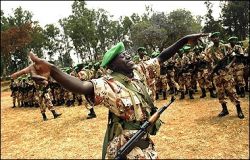AU to more than double Darfur mission by end of September
ADDIS ABABA, April 28 (AFP) — The African Union (AU) decided to more than double the strength of its peace monitoring mission in Sudan’s troubled western region of Darfur within five months, officials said.

|
|
Rwandan troops sing and dance in Camp Kanombe, in Kigali, prior to flying to Sudan’s western region of Darfur in 2004. (AFP). |
The AU’s Peace and Security Council agreed to increase the size of its Darfur mission from the 3,320 that will be deployed by the end of May to 7,731 by the end of September and appealed to the pan-African body’s 53 members to support the operation with troops and cash, they said.
The council, modelled after the UN Security Council, approved an increase that will see a total of 6,171 military personnel and 1,560 civilian police deployed in Darfur by September 30, Said Djinnit, the AU commissioner for peace and security, said.
The boost in size “will help to further promote peace in Darfur,” Djinnit told reporters. “There was a need for spreading the presence of the AU mission troops in the whole region to be able to ensure a peaceful situation.”
The council is “still concerned about the continuing crisis in Darfur,” he said, referring to “acts of banditry and acts of violence” that have continued in the region despite efforts to end two years of fighting.
The decision by the council came a day after the AU formally asked to start talks with NATO for logistical support in its Darfur mission.
In Khartoum, Sudanese Foreign Minister Mustafa Osman Ismail said his country would accept NATO playing a supporting logistical role in Darfur.
“Our position is clear: ‘no’ to non-African troops but ‘yes’ to technical and logistical aid from NATO, all countries or all groups that are not African,” he told journalists.
NATO Secretary General Jaap de Hoop Scheffer, speaking during a visit to Tunisia, said the Alliance had only been requested to provide logistical assistance and that this was the only role it would consider playing.
Djinnit did not mention the request to NATO although he did say the AU was in dire need of support for the mission that before Thursday’s decision was costing 221 million dollars (171 million euros), most of which is being funded by non-African donors.
The AU now has some 2,200 troops in Darfur protecting AU observers monitoring a shaky ceasefire it brokered between Khartoum, its proxy militia and two rebel groups who have been fighting the government for two years.
However, three rounds of peace talks in the Nigerian capital of Abuja have made little progress and it is uncertain whether the discussions which are hoped to resume in the first two weeks of May will yield results.
Djinnit reaffirmed the AU’s belief that the Abuja talks were “the only framework to reach a peaceful solution in Darfur.”
The council “urged the parties to attend at high level the Abuja peace talks,” he said.
Khartoum said Tuesday it would participate in the new round of AU talks and Darfur’s main rebel group, the Sudan Liberation Movement, announced earlier this month that it was prepared to resume whenever the government was ready.
Earlier Thursday at AU headquarters here, UN chief Kofi Annan’s special envoy to Sudan, Jan Pronk, said that as far as he was concerned the AU force in Darfur, should number some 12,000 men.
“The AU presence has resulted in more stability where they are (stationed) but they have to be able to back up their mediation with force”, Pronk said, after attending part of the Peace and Security Council meeting.
He added that the force should be deployed in Darfur for a period of four years.
The Darfur conflict, which pits rebels against pro-government militia, has resulted in between 180,000 and 300,000 deaths and the displacement of some two million people.
The fighting began in February 2003 after black African groups rebelled against what they see as persecution from Khartoum’s Arab-led government.
Last month, UN humanitarian affairs chief Jan Egeland said there was an urgent need for the expansion to prevent the number of displaced Darfur residents from rising to three or four million from the current two million.
